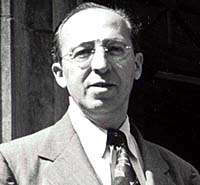Aaron Copland
|
|
Aaron Copland (November 14, 1900 – December 2, 1990) was an American composer of modern tonal music as well as film music. Copland's music achieved a difficult balance between simple and effective composition. His often slow harmonies were near motionless recalling the vast American landscape. He incorporated percussive orchestration, changing meter, polyrhythms, polychords and tone rows. Outside of composing, Copland often served as a teacher and lecturer. During his career he also wrote books, articles and served as a conductor.
| Contents |
Biography
Copland was born in Brooklyn, New York. Of Russian Jewish descent (his father's surname was "Kaplan" before he anglicized it to "Copland" while in England, before emigrating to the United States), he spent his childhood living above his parents' Brooklyn shop. Although his parents never encouraged or directly exposed him to music, at age fifteen he had already taken an interest in the subject and aspired to be a composer. His music education included time with Leopold Wolfsohn and Rubin Goldmark, also one of George Gershwin's teachers, and with Nadia Boulanger in Paris from 1921.
Upon his return from his studies in Paris, he decided that he wanted to write works that were "American in character" and thus he chose jazz as the American idiom. His first significant work was the necromantic ballet Grohg which contributed thematic material to his later Dance Symphony. Other major works of his first (austere) period include the Short Symphony (1933), Music for Theater (1925) and Piano Variations (1930). This jazz inspired period was brief, however as his style evolved toward the goal of writing more accessible works.
Many composers rejected the notion of writing music for the elite during the depression, thus the common American folklore served as the basis for his work along with revival hymns, cowboy and folk songs. Copland's second (vernacular) period began around 1936 with Billy the Kid and El Salon Mexico. Perhaps Copland's most famous work, Fanfare for the Common Man, scored for brass and percussion was written in 1942 at the request of the conductor Eugene Goossens. The fanfare was also used as the main theme of the fourth movement of Copland's Third Symphony. The same year Copland wrote Lincoln Portrait which became popular with a larger amount of the public leading to a strengthing of his association with American music. He was commissioned to write a ballet, Appalachian Spring, which later he arranged as a popular orchestral suite.
Copland was an important contributor to the film score genre. Several of the themes he created are encapsulated in the suite, Music for Movies, and his score for the film of Steinbeck's novel, The Red Pony, one of Copland's favourite scores, was given a suite of its own. Posthumously, his music was used to score Spike Lee's 1998 film, He Got Game.
Having defended the Communist Party USA during the 1936 presidential election, Copland was investigated by the FBI during the red scare of the 1950s. In 1953, his music was pulled from President Eisenhower's inaugural concert due to the political climate; that same year Copland testified before U.S. Congress that he was never a Communist. The investigation went inactive in 1955 and was closed in 1975. Copland's membership in the party was never proven.
Copland was a friend of Leonard Bernstein and a major influence on his composing style. Bernstein is considered the finest conductor of Copland's works.
Aaron Copland died in Peekskill, New York.
Media
Template:Multi-listen start Template:Multi-listen item Template:Multi-listen end
Works
- Symphony for Organ and Orchestra (1924)
- Music for the Theatre (1925)
- Dance Symphony (1925)
- Concerto for Piano and Orchestra (1926)
- Symphonic Ode (1927-29)
- Piano Variations (1930)
- Grohg (19??) (ballet)
- El Salon Mexico (1936)
- Billy the Kid (1938) (ballet)
- Piano Sonata (1941)
- Fanfare for the Common Man (1942)
- Lincoln Portrait (1942)
- Rodeo (1942) (ballet)
- Danzon Cubano (1942)
- Music for the Movies (1942)
- Appalachian Spring (1944) (ballet)
- Third Symphony (1944-46)
- The Red Pony (1948)
- Clarinet Concerto (commissioned by Benny Goodman) (1947-48)
- Twelve Poems of Emily Dickinson (1950)
- Piano Quartet (1950)
- Old American Songs (1952)
- The Tender Land (1954) (opera)
- Orchestral Variations (1957)
- Piano Fantasy (1957)
- Dance Panels (1959; revised 1962) (ballet)
- Connotations (1962)
- Music for a Great City (1964)
- Inscape (1967)
- Three Latin American Sketches (1972)
References
Kamien, Roger. Music : An Appreciation. Mcgraw-Hill College; 3rd edition (August 1, 1997) ISBN 0070365210
External links
- Audio (.ram files) of a 1961 interview for the BBC (http://www.bbc.co.uk/bbcfour/audiointerviews/profilepages/coplanda1.shtml)
- American Masters "Aaron Copland" at www.pbs.org (http://www.pbs.org/wnet/americanmasters/database/copland_a.html)
- The Aaron Copland Collection, 1900-1990, Music Division, Library of Congress (http://memory.loc.gov/ammem/achtml/achome.html)
- Review of "Howard Pollack, Aaron Copland: The Life and Work of an Uncommon Man" by R. James Tobin (http://www.classical.net/music/books/reviews/0805049096a.html)
- Who Was That Masked Composer? by David Schiff (http://www.theatlantic.com/issues/2000/01/001schiff.htm)
- How a composer cowed McCarthy (http://www.telegraph.co.uk/news/main.jhtml?xml=/news/2003/05/06/wmacca06.xml&sSheet=/news/2003/05/06/ixnewstop.html)da:Aaron Copland
de:Aaron Copland es:Aaron Copland he:אהרון קופלנד nl:Aaron Copland pl:Aaron Copland sk:Aaron Copland fi:Aaron Copland sv:Aaron Copland

